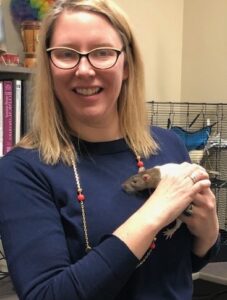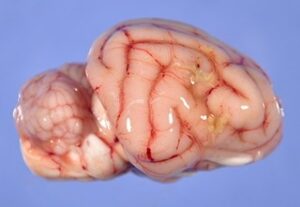-
Adopt
-
Veterinary Care
Services
Client Information
- What to Expect – Angell Boston
- Client Rights and Responsibilities
- Payments / Financial Assistance
- Pharmacy
- Client Policies
- Our Doctors
- Grief Support / Counseling
- Directions and Parking
- Helpful “How-to” Pet Care
Online Payments
Referrals
- Referral Forms/Contact
- Direct Connect
- Referring Veterinarian Portal
- Clinical Articles
- Partners in Care Newsletter
CE, Internships & Alumni Info
CE Seminar Schedule
Emergency: Boston
Emergency: Waltham
Poison Control Hotline
-
Programs & Resources
- Careers
-
Donate Now
 By Megan Whelan, DVM, DACVECC, CVA
By Megan Whelan, DVM, DACVECC, CVA![]()
angell.org/emergency
emergency@angell.org
617-522-7282
March 2022
Feline Infectious Peritonitis (FIP) has always been an elusive disease. FIP used to be considered a fatal disease, though it still has a high mortality rate, some cats have been treated successfully. The feline patient often presents with vague clinical signs such as a waxing and waning fever, lethargy, and inappetence. The factual underpinnings of how a common virus mutates and then manifests in the disease’s dry or wet form are still unknown. Many possible mutations can occur to the virus that inevitability can result in the disease. The disease can be costly to diagnose definitively, especially in the dry form, and owners of FIP patients still do not have many treatment options.
The disease was first described at Angell Memorial Animal Hospital by Dr. Jean Holzworth in 1962, and she referred to it as “chronic fibrinous peritonitis.” The disease typically occurs in young cats, who have a history of a stressful event, and it can run in familial lineages.1 Many owners, after receiving the diagnosis of FIP in their cat, search the internet for answers. Owners often will find the FIP Warriors website2 when they are searching the internet for hopes of a cure. This often leads to the bigger discussion between the owner and veterinarian on which of the two main avenues of treatment the owner will pursue. The first avenue is palliative and involves the use of corticosteroids. The other, which has gotten much attention recently, is the direct inhibition of the virus itself.1 Antivirals such as GS-441524, often referred to as “GS,” can be given orally or injected under the skin, typically for 12 weeks. This unlicensed medication is often obtained from China at a high cost to owners. In addition, there are many different brands of this medication, and the exact medication the owner is getting is not regulated.
Owners of patients with FIP at our hospital have, on their own accord, obtained the antiviral and have administered it themselves. Subsequently, they are then asking the veterinarian to run follow-up bloodwork and monitor the patient. This can put the veterinarian in a difficult position since this is not an approved medication. A recent study3, which surveyed via the internet owners who were using the antiviral GS for their cats with FIP, reported that 73.7% of owners utilizing the medication were from the United States. In addition, 74.3% of owners reported receiving some help from their veterinarian, whereas 25.7% reported receiving no veterinary help with the GS treatment.
The disease has variations, and the systemic extent can vary in cats. Below is a gross photo of a brain from a cat that had pyogranulomatous meningitis due to FIP.

Photo courtesy of Dr. Pam Mouser
Dickinson et al. recently published an article that described the use of GS-441524 to treat four cats with naturally occurring neurological FIP.4 The authors describe good clinical success with this treatment and that the dosage may be higher than those used in the nonneurological form of FIP. One of the authors, Dr. Niels C. Pedersen, has a great website5 on FIP, and it covers the extensive research he has conducted on this disease.
We are currently collecting the data for a retrospective study on FIP at Angell Animal Medical Center. The study’s goal is to clinically determine what has changed with this disease from a decade ago; we seek to learn about the percentage of FIP cases that we are seeing and the survival rate as more clients are utilizing additional treatment options that were discussed above. Of course, more studies need to be conducted to determine best practices and recommendations in the future for those patients with a diagnosis of FIP.
References
- Kennedy M. Feline Infectious Peritonitis. Vet Clin North Am Small Anim 2020; 50:1001-1011.
- Website: https://fipwarriors.com (accessed: 2/11/2022)
- Jones et al. Unlicensed GS-441524-Like Antiviral Therapy Can be effective for at-Home Treatment for Feline Infectious Peritonitis. Animals 11(8), 2257, 2021.
- Dickinson et al. Antiviral treatment using the adenosine nucleoside analogue GS-441524 in cats with clinically diagnosed neurological feline infectious peritonitis. J Vet Intern Med 24: 1587-1593, 2020.
- Dr. Pedersen’s website: https://sockfip.org (accessed: 2/11/2022)